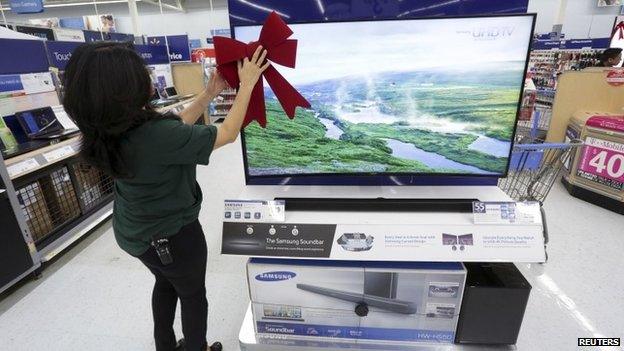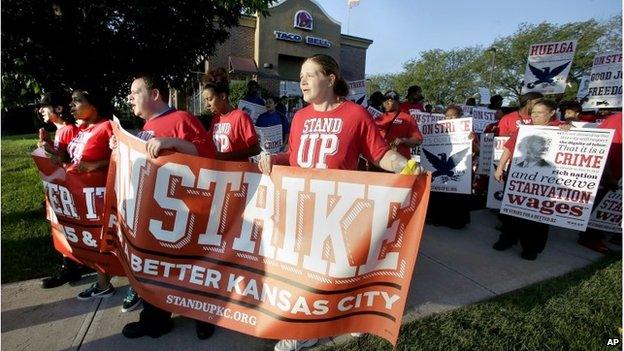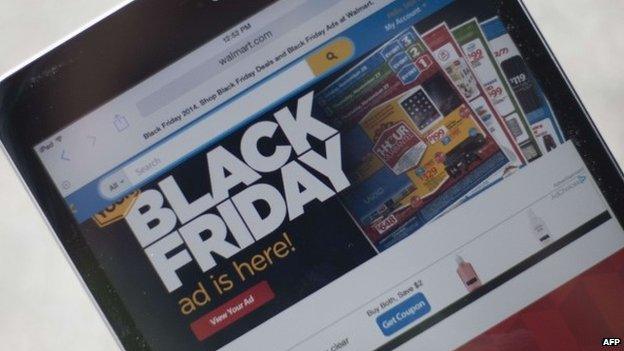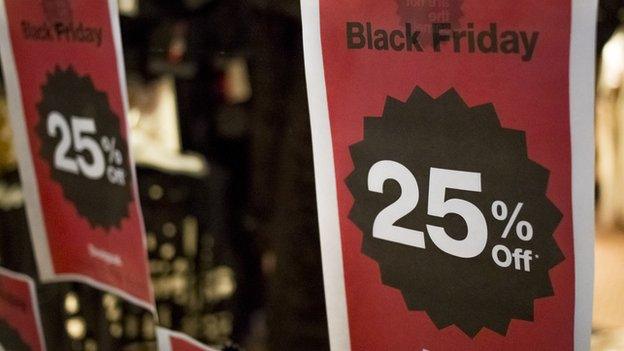Black Friday: Wal-Mart workers revolt
- Published
"This protest is against Wal-Mart, but also against the low wage economy" - Samira Hussain reports from a picket line in New Jersey
Black Friday has long been the most important day of the year for the US retail sector.
But in a new twist, it is also becoming the most important day for some US workers.
For the third year in a row, a group of labour organisers and Wal-Mart workers are planning to stage a series of strikes.
They will be protesting against working conditions at the US's largest retailer, at a record 1,600 locations across the US.
Barbara Gertz is one of those Wal-Mart workers who has decided to take part.
An overnight stocker in a Wal-Mart in Aurora, Colorado, Ms Gertz started working at the chain six years ago after her husband's concrete business took a hit during the financial crisis.
Although she earns $12.40 an hour, her family still struggles to make ends meet.
"I have dental insurance but I can't afford the deductible [minimum payment] so for the last month I've been living in pain because I can't afford to get a filling redone," she says.
She says that for years she tried to bring her concerns about scheduling and promotions to the attention of Wal-Mart management, and the impact on workers at busy times, but has struggled to get a response.

Barbara Gertz has worked for six years as an overnight stocker at a Wal-Mart store in Aurora, Colorado
That is why she agreed to participate with Organization United for Respect at Wal-Mart (OUR Wal-Mart), a coalition of Wal-Mart workers.
"We reach out to Wal-Mart every day of the year and we ask them to correct their business practices and they ignore us," Ms Gertz says.
"Being that Black Friday is the most important shopping day of the year, we felt maybe we could make an impact on that day and they would listen to us."
Unrepresentative?
A Wal-Mart spokesperson, Brooke Buchanan, said that the company has "an open door policy where associates can share any of their questions or concerns".

Many Wal-Mart staff have been busy getting stores ready for the shopping frenzy on Friday, 28 November
"Unfortunately the labour unions, who do not represent the 1.3 million associates that work at Wal-Mart in the US, use the holiday season to support their agenda," she adds.
Wal-Mart says that the majority of those who will be protesting across the country are union workers or supporters.
Those unions have been working for many years, largely unsuccessfully, to try to unionise Wal-Mart workers and other low-paid retail employees.
Alt-labour
What is different this time around is that unlike those traditional unionisation efforts, the OUR Wal-Mart coalition is part of a new group of so-called "alt-labour" groups that are taking a new approach to arguing for workers' rights.

Other retailers, such as the food chain Taco Bell, have seen protests by the "Fight for 15" campaign
Instead of immediately pushing for unionisation, the focus is on staging demonstrations and strikes that put pressure on employers to change specific practices.
"Labour law has gotten so pro-employer that there are actually benefits to not be a union," says Ruth Milkman, a professor of sociology at the City of New York (CUNY) Graduate Center.
"Unions are prohibited from many kinds of picketing unless there is a legal strike possibility [but] these [new] groups can do anything."
Occupy roots
The new strategy is a result of the Occupy movement, whose success was viewed as a model for agitating for change.

Black Friday comes with massive advertising hype, as well as price reductions
In addition to the Wal-Mart coalition, retail workers have also banded together to stage nearly a dozen one-day "Fight for 15" strikes and walk-outs over the past two years.
Fight for 15 is the name of the movement that has asked fast-food workers to walk off the job for one day to demand that the minimum wage be raised from $7.25 per hour to a so-called living wage of $15 per hour.
While the various groups' demands are different, they have been working together.
"We support each other, we co-ordinate with each other and we learn from each other," says Dan Schlademan, the director of the Making Change at Wal-Mart campaign, which is supported by the United Food & Commercial Workers (UFCW).
In particular, the two campaigns have been able to co-ordinate the building of so-called protest infrastructure - the social media Facebook pages and Twitter feeds - that can be put in place and then immediately rolled out to capitalise on individual issues.
"For a long time there were things that people cared about but there wasn't a pathway for them to engage - now those walls are falling down," says Mr Schlademan.
"Five years ago the campaign we're moving probably wouldn't be possible."
Perfect storm
This strategy of single issue, one-day engagement that is focused on maximum publicity, and helped along by social media, is perfectly timed for the media maelstrom surrounding Black Friday.
That has been particularly true in recent years, as competition has forced retailers into ever earlier opening times.
"Black Friday has been brought into a certain amount of controversy," says Nelson Lichtenstein, the director of the Center for the Study of Work, Labor and Democracy at the University of California, Santa Barbara.
Wal-Mart and other retailers have asked workers to come into stores ever earlier - eating into time spent with families on the Thanksgiving public holiday.
"Now, when you think about Black Friday, the American population thinks not just about good deals but also, what about the people who work there?" Mr Lichtenstein adds.
He notes that if Wal-Mart was forced to change its scheduling practices, that would represent a huge victory.
"It [would] set a precedent that the retailers can't schedule their workers at any time they want," he argues.
The US is still suffering from the scars of the financial crisis, when many Americans like Ms Gertz were forced to go in search of low-paying work just to make ends meet,
OUR Wal-Mart says it is simply trying to draw attention to how the explicit consumption of Black Friday seems increasingly at odds with the needs of many workers.
This year, they hope to put a black mark on Black Friday.
Will you be out looking for a bargain in the Black Friday sales? Send your comments to haveyoursay@bbc.co.uk, external
Share your pictures with us, email yourpics@bbc.co.uk, external, upload them here, external, or tweet @BBC_HaveYourSay, external.
Read our terms and conditions.
- Published29 November 2013
.jpg)
- Published27 November 2014
